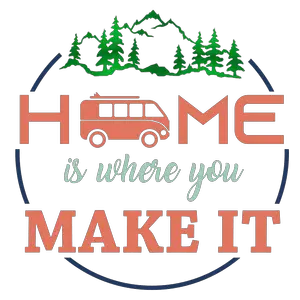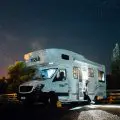Hey! This site is reader-supported and we earn commissions if you purchase products from retailers after clicking on a link from our site.
Whether your boondocking or staying in a modern campground or RV park, most peoples number one concern is their personal safety and the safety of those that are traveling with them. While no one can completely ensure that another won’t steal from them or break into their RV, there are steps you can take that will ease your mind when you have concerns about the safety of your RV and more importantly yourself.
RV safety can be broken down into two parts, personal safety and the protection of your property and your RV. In this guide will look at how best to protect yourself from accidental occurrences and from people that may wish to harm you or steal from you.
Fire safety
Fire is probably the biggest safety concern for any seasonal or full-time RVer, boater or tiny home dweller and it would be in your best interest to safeguard against any possibility of this tragedy happening to you. That said, your RV should be equipped with smoke alarms and fire extinguishers. Depending upon the size of your RV. I recommend placing a smoke detector on each end of your rig although this will probably not be necessary in a class B motorhome or smaller camper.
Fire extinguishers are another important safety item to have readily available too. I keep three to four fire extinguishers in my RV and I have another one in my tow vehicle. In my 5th wheel I keep an extinguisher next to the entrance, in my bedroom area and another mounted in my kitchen area. I also keep an extinguisher in one of my storage bays and I have an inexpensive holder that is mounted outside of the entrance door to my coach. When I’m stopped and set-up for camping, I take the fire extinguisher that I have stowed away in the compartment and I secure it into the holder outside. This way I have fast and easy access to it should a campfire or BBQ grill get out of hand.
Another way to secure your safety when fire is a concern is to understand your appliances such as the stove and refrigerator. Many RVs will have refrigerators that operate on electric or propane so it’s very important that you keep the areas behind them free of dust or dirt and allow them to exhaust properly. The same can be said about propane furnaces and stoves or ovens. Keep these areas clean and make sure they are being exhausted properly.
Carbon monoxide
Anytime you are using some fossil fuel to heat, cool or cook in your RV, you are putting yourself at a risk of prolonged exposure to carbon monoxide fumes. Your furnace, refrigerator, and stove can all be sources of this type of poisoning and it’s important that’s they’re properly vented and equally as important that a carbon monoxide detector be installed in any type of motorhome or camper. This is especially crucial if you have a class C or A motorhome where your engine has a cowling that is accessed by way of the driving compartment or if you have an onboard gas, propane or diesel-powered electric generator.
Safety from others
In my travels I have found that a lot of safety and security concerns revolve around the aspect of other people. While I have observed that most people are honest and well meaning, there are others out there that are of questionable character and the wise RVer should take precautions to avoid those that may want to harm or steal from you.
Install motion sensor lights
One precaution I have always taken is to install a 12-volt motion sensor light above my entrance door and in the rear of my RV. These are relatively inexpensive, and they can be hard wired directly into your RV’s electrical system with little amount of energy or time. Since I boondock quite often these give me some piece of mind, but you should be aware that all sorts of critters that roam the night will set these off.
Put valuables away
Another precaution to take when camping is to keep any temptations put away. Leaving such things as expensive lawn furniture, electronics, coolers and gas grills out at night or when you are away from your RV for any length of time is inviting trouble. This is especially true if you are boondocking and are in an area with little or no people around.
Door, window, and compartment locks
Doors and windows should be locked when you away from your rig and you should also consider visiting a locksmith and have them install new locks on your compartments. Quite often, various RV manufacturers will use the same hardware so it’s not unusual for the compartment keys you were given when you purchased your RV to fit other RVs regardless of their make or model.
Leave an indoor light on
Just as you would in a conventional home, I would also suggest leaving an indoor light on in your kitchen area or drivers compartment to give the impression that someone is awake or at home. You may want to vary which lights are on each night, so passersby don’t think you always leave a certain light on.
How to protect against traffic accidents
Sometimes traffic accidents just can’t be avoided. People will cut you off, they will cross over into your lane, disobey traffic lights or signals and various other things that are beyond your control. For these reasons, I recommend that you install a dash camera so that should an accident occur, you will have evidence as to who’s at fault in the accident.
Upgrade your mirrors
Proper mirrors are a good idea and I recommend even upgrading your mirrors to try to eliminate any blind spots. Blind spots can also be a problem in most RVs regardless of whether they are a motorhome or camper so it would be wise to install a back-up camera to keep track of any traffic directly behind you. These cameras are also a good idea to have so you can see if any pedestrians or vehicles are behind you if you are backing up.
Install hitch locks
As I referred to earlier, making your campsite as temptation free as possible is one way to avoid theft, but if you are away from your site for a longer period of time you may want to consider installing a hitch lock which will secure your trailer and prevent someone from hooking up to your rig and driving away with it.
While this is uncommon, it does happen, and thefts of these types occur where little or no people are camping. If you’re traveling with a cargo van or small camper that is easily towed away, I would recommend a hitch lock. These come in various sizes and I have even seen some locks that will fit a 5th wheel hitch.
Check out our recommendations for the best trailer hitch locks.
Alarm systems and security cameras
There are some alarm systems for RVs but many of them rely on audible signals to warn the owner of a burglar. While these are good if you happen to be around, they aren’t much use to you if you are miles away fishing or hiking. Also, would you want to be camping near a rig that may be experiencing a false alarm and is blaring a loud alarm while its owners are away?
Some of these motion detectors and intruder systems do work in conjunction with a call-in service to an alarm company, however, most of them are not compatible for people that are traveling in an RV and looking for their company to contact a local law enforcement agency.
Frankly, I would recommend buying a home security system that you are able to connect to a DVR that allows you to access the cameras remotely via another device and keep it as wireless as possible.
While these cameras and their security system are meant to be installed on a more permanent bricks and sticks home, they will still work on your RV. What I like about this system is that Hiseeu is utilizing software that records what is happening and sends you live feeds of your camera system via another device.
While this is a good system, keep in mind that it is usually powered by 110v and needs to have a constant power supply. That’s not really a problem for those that are plugged into a shore power or have an alternative power source such as solar or wind power, but it could become a problem with those that have no generator or alternative power source.
That said, it’s what I would recommend simply because you can connect to it almost immediately and it will give you live updates. While the cameras do require a separate power supply, the cameras submit their data back to the receiver in a wireless format. To me this is almost invaluable.
Final words on your RV security system
However, keep in mind that while your wireless camera systems have recorded a problem, the rest is going to be up to you. Take a note of where your RV is located exactly by GPS and be prepared to share those coordinates with any emergency responders that answer the call. Know the cross streets and physical location of your rig whether you are in it or just “gone fishing”.
As far as fishing…I’m having a nice time getting some upgrades to my electrical system on my 5th wheel and I’ve been volunteering at a sea turtle sanctuary. Sometimes the best fishing is letting them go. Until next time…Hope to see you out there.




